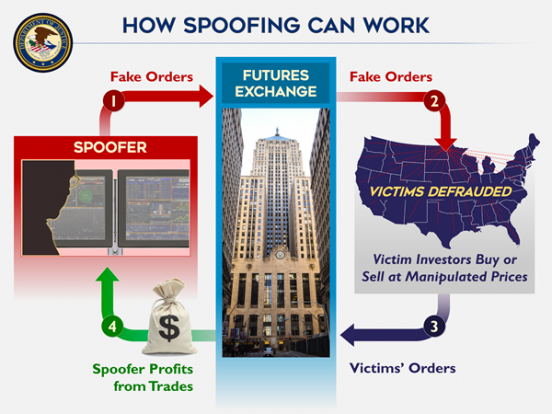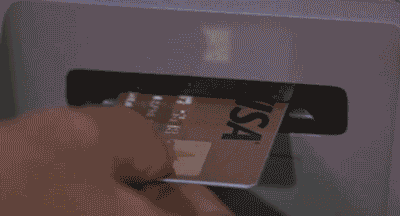|
|
Post by Entendance on Oct 1, 2022 4:38:20 GMT -5
|
|
|
|
Post by Entendance on Oct 2, 2022 2:32:27 GMT -5
 Massive Central Bank Ponzi Creates Permanent Distortion Massive Central Bank Ponzi Creates Permanent Distortion
Three-time, best-selling book author Nomi Prins says the reason why there is so much uncertainty and chaos in the global economy comes down to one simple theme, and that is a couple of decades of central bank money printing has created the biggest Ponzi scheme the world has ever seen. Prins explains, “The Fed and other central banks have created basically this idea, and put it into practice, whenever there is real crisis, however they deem it, they are going to print money, and a lot of money... and pushing this envelope forward on the back of a very artificial fabrication of money. That is the Ponzi scheme here. The Ponzi scheme is actually the money that is sloshing around and is somehow owed more to reality. That it is owed to actual profits, actual production, actual growth in the economy, which it isn’t...Look at the way money gets printed...as we saw and everybody woke up from the pandemic. Look at all the closures in the economy, and the economy still has not gotten back to where it was. It is still not stable. People are still facing economic angst, but the Fed created four and a half trillion dollars of money basically overnight. That’s a Ponzi scheme. That is something that is going to keep going whenever there is a crisis, and that is going to paper over the fact we are not actually healthy...That’s the definition of a Ponzi scheme when you always have new money coming in, and in this case, it’s new money being created by the central banks. It will replace any cracks, any faults, any problems that are emerging along the way...The Fed doubled its balance sheet and did not double the economy...That’s a Ponzi.”
Prins goes on to say, “We are not retiring $30 trillion in U.S. debt. We are not retiring $287 trillion in debt around the world. That is not happening...Yes, there are indications we could have a massive crash, but to me...I think there is a treadmill that is spinning here that is going to keep spinning instead of completely crashing. That’s why I think there is going to be a lot of mini crashes, followed by mini rallies along the way. I don’t think we are in a period, which is why I call this a permanent distortion, where there is going to be a backing off of all the money that is being created...I don’t see one massive crash. I see massive turbulence, which is this permanent distortion. . . .I don’t see an end point unless there is an external factor...There are things that are coupled with the instability we have in the markets relative to this money being printed...and if they come at the same time, yes, we could have a massive crash, we absolutely could.”
Meanwhile, in the real economy, the struggles for common people will continue to get worse. Prins says, “Right now, about 20 million families in the United States are behind by one or more payments on their electric bill because they cannot afford them at these levels relative to rent and food and all these other things that are going up. 20% of Americans are using their credit cards now to pay their utility bills, and they are starting to get behind on those credit cards for which rates have gone up. So, we are in this situation where all these problems are happening at the same time for most real people in the real economy...Raising interest rates so quickly is hurting people way more than people leveraged in the markets.”  Prins’ advice for common people is to stay away from debt, buy gold, silver and other metals, and hold on to some cash. Prins says, “I do think the dollar will weaken from its high levels, but I think it is going to strengthen first...When we get to the Fed three-part pivot (smaller rate increases, followed by neutral policy and then more money printing), we are going to see a weakening of the dollar.” There is much more in the 55-minute interview Prins’ advice for common people is to stay away from debt, buy gold, silver and other metals, and hold on to some cash. Prins says, “I do think the dollar will weaken from its high levels, but I think it is going to strengthen first...When we get to the Fed three-part pivot (smaller rate increases, followed by neutral policy and then more money printing), we are going to see a weakening of the dollar.” There is much more in the 55-minute interview
Down, Down, Down in a Burning Ring of Fire 
|
|
|
|
Post by Entendance on Oct 5, 2022 7:26:57 GMT -5
|
|
|
|
Post by Entendance on Oct 7, 2022 2:19:31 GMT -5
There is a growing realisation that the world faces a combination of persistent inflation of prices and a recession at the same time. The factors driving both are visibly intensifying. Those of us versed in the cycle of bank credit are aware that it is the contraction of bank balance sheets which is driving the recession,  while it is continuing currency debasement driving inflation. while it is continuing currency debasement driving inflation. Neo-Keynesians in the establishment think the current position is contradictory, that current rates of price inflation will decline back to their 2% target in a recession, and interest rates can then be reduced to stimulate economic activity.
The key to understanding why prices can continue to rise in a recession requires a fuller understanding of the role of credit in an economy and what it represents. Its role is far greater than commonly thought, with considerably more than several quadrillions of dollar equivalents outstanding. All economic activity and wealth are credit. This article sketches out the various types of credit, and how credit equates to our collective wealth.
It also requires us to differentiate between a currency which is anchored to gold specie and one without a specie anchor.
The former imposes a discipline on the state of non-intervention, while the latter encourages intervention. It is that intervention which leads to fiat currencies and all credit based upon it finally collapsing. ...

|
|
|
|
Post by Entendance on Oct 12, 2022 8:27:44 GMT -5
Now some wealthy clients are starting to pull their money...
 'There is a growing feeling in markets that a financial crisis of some sort is now on the cards. Credit Suisse's very public struggle to refinance itself is proving to be a wake-up call for markets, alerting investors to the parlous state of global banking. 'There is a growing feeling in markets that a financial crisis of some sort is now on the cards. Credit Suisse's very public struggle to refinance itself is proving to be a wake-up call for markets, alerting investors to the parlous state of global banking.
This article identifies the principal elements leading us into a global financial crisis. Behind it all is the threat from a new trend of rising interest rates, and the natural desire of commercial banks everywhere to reduce their exposure to falling financial asset values both on their balance sheets and held as loan collateral. And there are specific problems areas, which we can identify.
The phenomenal growth of over-the-counter derivatives and regulated futures has been against a background of generally declining interest rates since the mid-1980s. That trend is now reversing, so we must expect the $600 trillion of global OTC derivatives and a further $100 trillion of futures to contract as banks reduce their derivative exposure.
In the last two weeks, we have seen the consequences for the gilt market in London, warning us of other problem areas to come.
Commercial banks are overleveraged, with notable weak spots in the eurozone, Japan, and the UK. It will be something of a miracle if banks in these jurisdictions manage to survive contracting bank credit and derivative blow-ups. If they are not prevented, even the better-capitalized American banks might not be safe.
Central banks are mandated to rescue the financial system in troubled times. However, we find that the European Central Bankand its entire euro system of national central banks, the Bank of Japan, and the U.S. Fed are all deeply in negative equity and in no condition to underwrite the financial system in this rising interest rate environment...'
|
|
|
|
Post by Entendance on Oct 15, 2022 7:37:41 GMT -5
|
|
|
|
Post by Entendance on Oct 16, 2022 4:09:33 GMT -5
Banksters Cartel International LVIII
'...In a world where your bank may close down your account because they claim you hold the wrong opinions; how can you trust them to be straight about anything else?...'
 Catherine Austin Fitts (CAF), Publisher of The Solari Report and former Assistant Secretary of Housing (Bush 41 Admin.), says what is coming for the economy is pain–and lots of it. CAF explains, “We are either in a major correction or we are going to go into a bear (market), and a lot of it depends on many different politics. If you look at the money being pumped out...on climate change, on green energy, environment and all theses and all these different new sort of scams, it depends on how they inject money. It’s either a major correction or it could turn into a bear (market). There is no way to tell because it is purely political.”
Various Fed presidents are repeatedly saying the central bank is going to continue raising interest rates. Why? CAF says, “I think they are going to keep raising interest rates. If you are Federal Reserve, you are playing a global game, and what you have to do is protect the reserve currency status. It looks like to me they have decided that all the BIS (Bank of International Settlements) members need to be in the dollar channel. They are doing everything they can to collapse the market share of the euro and then move that into the dollar syndicate. I think they have to keep driving the dollar up. The U.S dollar index is up to 113, and at one point it was at 114. One analyst said it was going to 120. They have the entire frontier market and the emerging markets in a bear trap, and that is very significant power. If you are going to go into the woods and shoot the bear, you can’t wound the bear, you have to kill the bear. So, I think the Fed is going to keep doing this for some time now. They don’t mind, as you learned from the pandemic, collapsing the small business side of the economy or collapsing the middle-class...They are implementing the ‘Going Direct Reset.’ They are doing a currency reset. What you are looking at is a fundamental reengineering of the governance system on planet Earth. Most of the benefits in the dollar system come from the benefits of having the reserve currency and being able to swap money you print out of thin air for real labor and real commodities worldwide. That’s an enormous benefit, and they are going to protect that benefit. If they don’t protect that benefit, they run the risk of everybody moving out of the channel. This is what the Chinese and Russians are trying to do. They are trying to move out of the dollar channel and trying to create economic resiliency and trade outside the channel. What the Fed is trying to do and the dollar syndicate is trying to do is protect that channel...It’s global government reengineering. It’s 100% power politics, and it’s a war.”
In short, the Fed will defend the dollar and the world reserve currency status no matter how hard the stock market crashes, no matter how much the economy crashes, no matter how much the bond market crashes and no matter how much the housing market crashes.
In closing, CAF says, “Stop helping them...Don’t bank at the big banks...use cash whenever you can, and pray...This is first and foremost a spiritual war, and prayer is the best navigation tool possible. With this level of uncertainty and change, there is no way there is enough experts to help you and enough time to listen to them all. You have to focus on what is important. You have to decide are you here to be free or are you here to be a slave? There is no more middle of the road. There are two sides, one leads to freedom and one leads to slavery. You have to choose.”
There is much more in the 58-minute interview.
|
|
|
|
Post by Entendance on Oct 17, 2022 1:53:56 GMT -5
'...It’s long past the time to restore Glass-Steagall and permanently separate the nation’s taxpayer-backstopped banks from the Wall Street casino.'
Three Business Days after Credit Suisse Was Named “Credit Derivatives House of the Year,” Its Own Credit Derivatives Blew Out
Nam tua res agitur, paries cum proximus ardet. -Quintus Horatius Flaccus
It is your concern when your neighbors’s wall is on fire...You too are in danger when your neighbor’s house is on fire
è in ballo anche la casa tua, se brucia la casa del vicino
Ton intérêt est en jeu, quand la maison du voisin brûle
Dein Eigentum wird gefährdet, wenn des Nachbarn Haus brennt.
|
|
|
|
Post by Entendance on Oct 24, 2022 8:23:24 GMT -5
Sunak’s 13 years in finance include a number of controversial events
|
|
|
|
Post by Entendance on Oct 27, 2022 12:49:57 GMT -5
|
|
|
|
Post by Entendance on Oct 31, 2022 8:15:38 GMT -5
Why the world's PENSION FUNDS are WRECKED
|
|
|
|
Post by Entendance on Nov 3, 2022 2:42:58 GMT -5
The Era of All-Powerful Central Banks Is Over
|
|
|
|
Post by Entendance on Nov 4, 2022 3:11:34 GMT -5
'...As dealers in credit, banks face the most difficult times in living memory. Austrian economists have long understood that the business cycle is driven by a cycle of bank credit. The root of the credit cycle has been ignored by statist economists and policymakers who respond by suppressing the evidence. This has been going on with increasing intensity since the 1980s, when the Fed under Paul Volcker broke with interest rate suppression to slay the 1970s inflation dragon.
Since then, the era of pre-Bretton Woods price stability has been replaced by the fiat dollar as the reserve currency, with demand for it engineered by Triffin’s dilemma: balancing the export of dollars through budget and trade deficits with global demand for it. The expansion of derivative markets served to conceal the inflationary effects by shifting the supply of dollar credit into financial markets, away from non-financial activities. This lessened the consequences of currency expansion on the prices of goods and services, allowing the monetary authorities to suppress interest rates without apparent ill effects.
That period has now ended, and The Great Unwind of all the distortions accumulated over the last four decades has begun. No one in government and central banking circles saw it coming, and they are still in denial. Commercial bankers are becoming acutely aware of the dangers to their business models. At the moment, they have only a growing fear of the consequences of interest rates seemingly out of control. Having been protected from free markets by central banks and their regulators, this loss of statist control is immensely worrying for them.
It is now dawning on commercial bankers that they have been left high and dry, with over-leveraged balance sheets, loan business rapidly souring, loan collateral falling in value, and a derivative merry-go-round about to implode. They must stop pandering to regulators and public opinion, and now protect their shareholders from The Great Unwind by dumping credit obligations as rapidly as possible ahead of the wider banking crowd.
From banking deregulation in the mid-eighties, it took nearly four decades to get to this point. The Great Unwind might take only as many months.'
|
|
|
|
Post by Entendance on Nov 6, 2022 18:14:49 GMT -5
The global credit system is imploding
'...With bank balance sheets now highly leveraged, the urgent imperative for bank directors is to reduce the ratio of balance sheet assets to their bank’s own capital. The larger banks being public companies, their directors have an obligation to protect their shareholders’ interests. And with interest rates now rising, there is a growing threat of falling financial asset values undermining both balance sheet investments and loan collateral.
Depositors rely for their protection on the duty of a central bank to ensure that the banking system does not fail. Failing that, there are deposit protection schemes to protect smaller deposits. But since central banks inflated their balance sheets with bonds acquired through quantitative easing, rising interest rates are now leading to substantial mark-to-market losses, driving the central banks themselves into insolvency. In the financial systems of the major economies, we now face the prospect of insolvent commercial banks having to be backstopped by insolvent central banks. The scope for loss of public confidence in the entire credit system is becoming more threatening by the day.
This is not the only threat to currency values. As we have seen, nearly all transactions in the economy are settled in commercial bank credit which is now contracting at an accelerating rate. With all eyes on GDP, the impact will be seen by governments as highly deflationary. Government revenue receipts will be threatened with collapse, and mandated welfare obligations will soar.
The Keynesian approach is to double down on failed policies and replace the contraction of private sector credit with an expansion of public sector debt, for fear of deflationary conditions. But for the public and the foreign exchanges, the additional debasement of the major currencies becomes suddenly more obvious than the contraction of bank credit which is the proximate cause for the GDP crisis. It will be a miracle if confidence in the currencies and the entire credit system does not fail completely.
The lesson we should learn from the relationship between the two principal forms of bank credit is that the impact of central bank credit debasement on a fiat currency’s purchasing power undermines faith in it to a far greater extent that an equivalent change in commercial bank credit. And that if credit was bound properly to money, the crisis would have been avoided.'   Legal definitions of money and credit Legal definitions of money and credit
 The emptier the hearts and minds, the louder the voice, the more elaborate the rules and ceremony.
The Fed released their Financial Stability Report late on Friday.
Not exactly prime time for the news media.Wall Street On Parade highlighted this particular observation from that report:
“The larger the bank, the greater the potential spillover if it defaults; the higher its leverage, the more prone it is to default under stress; and the greater its connectivity index, the greater is the share of the default that cascades onto the banking system. The product of these three factors provides an overall measure of the contagion risk that the bank poses for the financial system. Five of the U.S. banks had particularly high contagion index values — Citigroup, JPMorgan, Morgan Stanley, Bank of America, and Goldman Sachs.”
If only we had some regulator which had the power and capability to temper the systemic riisk of these overleveraged, derivative monstrosities of a national banking system.
Oh yeah we do.
It's called the Fed.
And they have been serving the Banks, at the expense of the public, since 1913. -Jesse
! :! :!
|
|
|
|
Post by Entendance on Nov 12, 2022 5:22:35 GMT -5
|
|
|
|
Post by Entendance on Nov 14, 2022 9:27:48 GMT -5
|
|
|
|
Post by Entendance on Nov 18, 2022 2:59:04 GMT -5
|
|
|
|
Post by Entendance on Nov 21, 2022 3:29:04 GMT -5
'The collapse of Sam Bankman-Fried’s crypto-currency exchange FTX, resulting in the loss of at least $1 billion of customer money, will be used to demand more regulation of the crypto-currency business. Yet its growth, collapse and the murky web of corrupt connections surrounding it were a product of the decade of “funny money” that has allowed fraud to flourish, as it always does in such periods. The blame for the Bankman-Fried debacle, therefore, can be traced back to one source: the unjustifiable corruption of monetary policy by Fed chairman Ben Bernanke...'
|
|
|
|
Post by Entendance on Nov 26, 2022 11:43:14 GMT -5
|
|
|
|
Post by Entendance on Nov 28, 2022 9:09:03 GMT -5
'...Clearly, the U.S. banking system is not in competent regulatory hands — or those hands have been tied by inaction from Congress in its failure to pass appropriate legislation. The American people need to put this issue on the front burner before there is a replay of the financial collapse of 2008 – or worse.'
With Crypto Bank, SoFi, the Fed Is Setting the Stage for the Same Disastrous Decision It Made with Citigroup in 1999
Federal Reserve set to introduce privacy-crushing digital currency that can be ‘controlled’ and ‘programmed’ by government bureaucrats
|
|
|
|
Post by Entendance on Dec 3, 2022 6:06:02 GMT -5
Banksters Cartel International LXIX
 TD Securities announced Thursday that it was stopped out of its tactical short silver position. The bank said it is booking a 14% loss after "an epic positioning squeeze contributed to a +25% rally from the October lows." TD Securities was short silver as it expected that rising U.S. interest rates combined with the growing threat of a recession would significantly weigh on the precious metal...Silver rally stops TD Securities out of tactical short TD Securities announced Thursday that it was stopped out of its tactical short silver position. The bank said it is booking a 14% loss after "an epic positioning squeeze contributed to a +25% rally from the October lows." TD Securities was short silver as it expected that rising U.S. interest rates combined with the growing threat of a recession would significantly weigh on the precious metal...Silver rally stops TD Securities out of tactical short
|
|
|
|
Post by Entendance on Dec 5, 2022 8:34:50 GMT -5
 The Bubble Economy's Credit-Asset Death Spiral The Bubble Economy's Credit-Asset Death Spiral
Central banks seem to have perfected the ideal financial perpetual motion machine: as credit expands, money pours into risk assets, which shoot higher under the pressure of expanding demand for assets that yield either hefty returns (junk bonds) or hefty capital gains as the soaring assets suck in more capital chasing returns.
As assets soar in value, they serve as collateral for more credit. Higher valuations = more collateral to borrow against. This open spigot of additional credit sluices capital right back into the assets that are climbing in value, pushing them higher--which then creates even more collateral to support even more credit.
This self-reinforcing feedback of expanding credit feeding expanding valuations feeding expanding collateral which then feeds expanding credit has no apparent end. Modest houses once worth $100,000 are now worth $1,000,000, and nobody's complaining except those priced out of the infinite spiral of prices and credit.
For those priced out of traditional assets, there's NFTs, meme stocks and short-duration options. The credit-asset bubble-economy casino has a gaming table for everyone's budget and desire to "make it big" via speculation, since the traditional ladders to middle-class security have all been splintered.
This financial perpetual motion machine distorts traditional incentives. Why bother renting a house bought for speculative gains? Renters are problematic, better to just let it sit empty and rack up huge capital gains.
Count the lighted windows at night in all those new condo high-rises. Are even 20% occupied? Probably not.
This is how you get a "housing shortage": investors would rather keep units clean and off the market rather than risk renting units. When credit and asset valuations are both feeding an infinite expansion, all that matters is leveraging capital to acquire as many assets as possible to maximize the gains from this self-reinforcing wealth-creation machine.
This machine also incentivizes fraud. To really maximize gains, why not borrow clients' capital? Indeed, why not?
But unbeknownst to the central bank sorcerers and the greed-crazed participants, all systems have limits and all consequences have their own consequences, i.e. second-order effects. There are many such dynamics which are eroding the apparently unbreakable financial perpetual motion machine.
One is debt saturation. Even low rates of interest eventually pile up consequential debt-service obligations, and any weakening in revenues, cash flow or income exposes the borrower to a cash crunch which can only be resolved by selling assets.
Another is the widening disconnect between financially sound valuations and "market" valuations set by rapidly expanding credit and collateral. Based on rental income or cash flow, Asset B is worth $200,000, but it's currently valued at $1 million, and still rising. Obviously, traditional methods of valuation no longer apply.
But weirdly enough, they do. Debt service doesn't matter when your collateral is expanding so fast you can borrow mountains of capital at "low, low prices" and not even consider debt service. But once collateral stops rising and interest rates start rising, suddenly all those absurd obsessions with cash flow start making sense.
But too late, too late: bubbles, regardless of how rock-solid the sorcery, tend to manifest symmetry: they fall at roughly the same rate and magnitude as they rose. As collateral declines, loans slide underwater as the asset is not longer worth more than the outstanding loan. Credit dries up and so does buying as greed-crazed buyers start worrying that perhaps the asset they're about to buy might actually be worth less next month (gasp).
Liquidity and the credit impulse aren't sorcery, they're herd behaviors. When the madness of the herd switches from greed to panic, buyers disappear and thus so does liquidity--the ability of sellers to find a Greater Fool to buy the depreciating asset.
Greater Fools are soon wiped out and then there's nobody left who's dumb enough to buy assets that are in freefall and still far above any financially prudent valuation. The magic circle reverses, and as valuations fall, collateral shrinks and credit collapses. Lenders who greedily reckoned valuations and thus collateral would rise forever are stuck with life-changing losses--along with all the punters who built shanties of credit and leverage they mistakenly viewed as permanent palaces.
In making the economy dependent on the financial sorcery of self-reinforcing credit-asset bubbles, central banks and all the greed-crazed punters who participated have guaranteed a self-reinforcing death spiral as the "virtuous" self-reinforcing wealth-creation machine reverses into a self-reinforcing wealth-destruction machine.
Who believed that central banks' financial perpetual motion machine was anything more than trickery designed to generate phantom wealth? Once the death spiral reaches its devastating end-game, the true believers will have fallen silent. - Charles Hugh Smith here
|
|
|
|
Post by Entendance on Dec 7, 2022 17:52:47 GMT -5
'If you’re the Chairman and CEO of a trucking company or air conditioner installer or a computer manufacturer (or thousands of other companies that don’t handle cash and have access to personal and financial data on millions of Americans) announcing to the world that 10 percent of your company’s new hires last year had criminal backgrounds might make you look like a social justice advocate.
If you’re Jamie Dimon, Chairman and CEO of the largest bank in the U.S. with 5,023 bank branches across the country taking in cash each day that represents the life savings of moms and pops and pension funds, announcing that 10 percent of last year’s new hires had criminal backgrounds is not exactly a confidence builder...'
Time has come for these banksters to go. The sooner, the better🦂
The banksters could care less about our safety and care about one thing and one thing alone: control of the money system & control over every facet of our financial life.
I wish I lived in the Golden Age, giving it up on the Broadway stage.
Hang with the rats and smoke cigars, have a break with Frank and count the stars.
Dressed to the nines, with hair to match. Shiny jewels, casino cash.
Tapping feet, wanna take the lead. A trip back in time is all I need!
|
|
|
|
Post by Entendance on Dec 10, 2022 2:16:00 GMT -5
|
|
|
|
Post by Entendance on Dec 11, 2022 5:19:08 GMT -5
 A federal jury in the Northern District of Illinois convicted a former trader at JPMorgan Chase and Credit Suisse today of fraud in connection with a spoofing scheme in the gold and silver futures markets. A federal jury in the Northern District of Illinois convicted a former trader at JPMorgan Chase and Credit Suisse today of fraud in connection with a spoofing scheme in the gold and silver futures markets.
 According to court documents and evidence presented at trial, Christopher Jordan, 51, of Mountainside, New Jersey, was an executive director and trader on JPMorgan’s precious metals desk in New York from 2006 to 2009, and on Credit Suisse’s precious metals desk in New York in 2010. Between 2008 and 2010, Jordan placed thousands of spoof orders, i.e., orders that he intended to cancel before execution, to drive prices in a direction more favorable to orders he intended to execute on the opposite side of the market. Jordan engaged in this deceptive spoofing strategy while trading gold and silver futures contracts on the Commodity Exchange (COMEX), which is a commodities exchange operated by the CME Group. These deceptive orders were intended to inject false and misleading information about the genuine supply and demand for gold and silver futures contracts into the markets...
|
|
|
|
Post by Entendance on Dec 12, 2022 9:32:28 GMT -5
 '...Even at this early stage of a new trend of rising interest rates, strains in the global banking system are becoming apparent. Bank balance sheets are as overleveraged as they have ever been particularly in Europe and Japan. And with rising interest rates ensuring a bear market in financial assets and widespread exposure to malinvestments leading to non-performing loans, banker sentiment is swinging firmly towards risk containment. '...Even at this early stage of a new trend of rising interest rates, strains in the global banking system are becoming apparent. Bank balance sheets are as overleveraged as they have ever been particularly in Europe and Japan. And with rising interest rates ensuring a bear market in financial assets and widespread exposure to malinvestments leading to non-performing loans, banker sentiment is swinging firmly towards risk containment.
Money supply figures, which are showing a slowing down in the rate of credit expansion, only tell some of the story. Commercial banks in the US and the EU are using reverse repos to jettison liquidity on the deposit side of their balance sheets, to keep pace with the drive to reduce the asset side of their balance sheets.
Acting like the canary in a coal mine, we can already see derivative liquidity drying up in regulated gold and silver futures. This is probably being replicated in other commodity markets as well. But a far larger issue is FX crosses, swaps and forwards, whose notional values are not properly reflected on bank balance sheets, just one side of counterparty exposure being more than double the combined global systemically important banks total capitalisation of roughly $40 trillion.
As with all credit contractions, when and where the system will break is virtually impossible to predict. But when it happens, the crisis will be sudden. We must hope that the year-end financial window-dressing season passes without incident.' Rising rates lead to financial accidents

 |
|
|
|
Post by Entendance on Dec 18, 2022 0:54:15 GMT -5
|
|
|
|
Post by Entendance on Dec 19, 2022 9:20:02 GMT -5
|
|
|
|
Post by Entendance on Dec 21, 2022 8:30:16 GMT -5
 '...Of course, not everyone wins from a Debt Jubilee. The losers would include credit card companies, auto manufacturers and banks, all of which would lose the value of the debt which for them is an asset...' Debt Jubilee '...Of course, not everyone wins from a Debt Jubilee. The losers would include credit card companies, auto manufacturers and banks, all of which would lose the value of the debt which for them is an asset...' Debt Jubilee
'...Chaos: It’s Now Inevitable Rather than Theoretical All things (and hence markets) so rigged, centralized and artificial ultimately result in destruction.
Whether 2023 witnesses more QT, or a resigned and panicked pivot to QE, the end result is the same: Chaos of one form or another is just around the corner.
Either we suffer 1) a deflationary implosion of global risk assets and economies, or 2) an inflationary surrender to more currency-destroying QE.
As I’ve said elsewhere, Powell and the rest of us will have to pick our poison. But in my view, we are likely to see both...'  Matthew Piepenburg here Matthew Piepenburg here
|
|
|
|
Post by Entendance on Dec 27, 2022 9:21:26 GMT -5
|
|